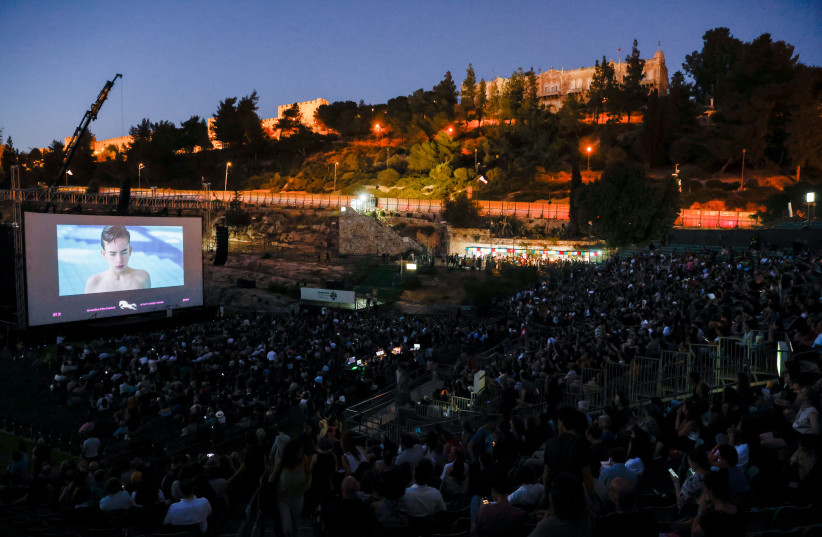Every year, the Jerusalem Film Festival makes a montage of clips from some of the 200 or so movies on its program, which is shown before each film and always includes a single clip with a few lines of dialogue. Usually I get sick of it after I’ve been to a couple of movies, but last year, this dialogue came from Justine Triet’s Anatomy of a Fall, which opens in theaters throughout Israel on March 28, and I never got tired of it.
Sandra Hüller, who has the lead role, speaks in such an un-actressy manner that when I first saw the clip, I thought it was from a documentary, not a drama. “Everybody is lost, no?” she asks. “Sometimes we fight together and sometimes we fight alone, and sometimes we fight against each other – that happens.”
It’s a compliment to her magnificent performance that I thought this was from a documentary. And when I saw the film, I was not disappointed but came out of it with an even greater admiration for her skill.
Hüller, best known for her role in Toni Erdmann, also starred as the vile Nazi wife who enjoys wearing furs looted from gassed Jews in The Zone of Interest, but Anatomy of a Fall, which won the Palme d’Or at the Cannes Film Festival and the Oscar for best original screenplay, gives her a much richer part.
She plays a successful writer named Sandra who lives in an isolated house in the Alps with her husband, Samuel (Samuel Theis) – also a writer, albeit a less successful one – and their son, Daniel (Milo Machado-Graner). It might sound like they have an idyllic life, but there are problems. Daniel was blinded in a traffic accident years ago, when he was with a babysitter, but his father blames himself for the mishap.

VERY EARLY on in the film, Daniel goes for a walk and discovers his father’s body – Samuel has fallen from the top floor and is lying dead on the snow. It was either an accident, a suicide, or a murder, and Sandra is the only suspect; much of the movie shows her trial.
Examining a troubled marriage
The screenplay quickly shifts from being an anatomy of a murder to an examination of a very troubled marriage, one that is deeply complicated in a way that illustrates the Tolstoy quote, “Happy marriages are all alike; each unhappy family is unhappy in its own way.”
As a rule, I find movies about unhappy marriages wearisome and annoying, so it’s an enormous compliment to the screenplay by Triet and Arthur Harari that this movie is the exception for me. Literary jealousy and financial insecurity – in spite of the gorgeous house – are among the problems at the core of this marriage, particularly their professional rivalry, which spills over into debates over childcare and every aspect of their domestic life.
Anatomy opens as Sandra is being interviewed by a young female graduate student and they seem to be flirting with each other – we later learn that Sandra is bisexual and has had many affairs with women. But their interview is cut short by Samuel, who is doing repairs on the top floor, blasting the song “P.I.M.P” by 50 Cent over and over.
The fact that she feels she cannot ask him to turn it down tells you all you need to know about their relationship – it’s messed up, obviously, but so many couples stay stuck in this axis of misery that it doesn’t seem unrealistically bad. It’s hard to feel for either character, though, since they both seem so immersed in making each other and themselves suffer.
But Daniel, a bright, sweet boy, does not deserve to live in such an unhappy household, and you hope for a resolution that will make his life at least a bit easier. The son’s dog Snoop, played by a pooch called Messi, the biggest on-screen canine star in decades, also has a key role in some of the film’s twists – and it’s some consolation that the boy gets such a nice dog.
That said, the film is not without problems, but it is so well done that you will likely only notice them later, when you think back on it. The idea of having a very wise but blind child be the only witness to a crime or suicide is so overly symbolic that it’s grating – he has been robbed of his vision, but can “see” the truth. Another aspect that may disappoint is that much is left unresolved. But neither of these problems bothered me while I was watching the movie, because I was so mesmerized by the twists of the story and by Hüller’s performance.
In the end, in spite of its flaws, Anatomy of a Fall will grab you, the way Hüller grabbed me, speaking those few lines I first heard on the clip. She just seems so much like a real person that you won’t be able to take your eyes off of her whenever she’s on screen – even if you will go back and forth about whether you would want this character for a friend.
